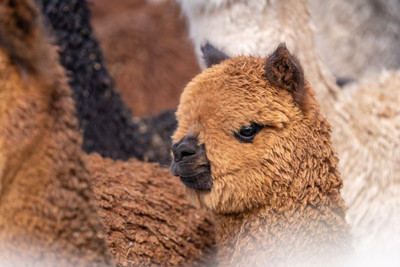The Next Frontier in Sustainable Living - Alpaca and Other Natural Fibers
Alpaca by Design on Dec 9th 2023
In an age where environmental consciousness is at the forefront of our minds, sustainable living has become more than just a trend—it's a necessity. As we navigate the complexities of climate change and strive to reduce our ecological footprint, the spotlight is increasingly turning towards eco-friendly alternatives. One such champion in the realm of sustainability is alpaca fiber, a natural wonder that combines luxurious qualities with an impressive environmental track record.
Alpaca Fiber Unveiled: A Sustainable Marvel
The journey to sustainable living begins with reevaluating our choices, and textiles are no exception. Alpaca fiber, harvested from the fleece of the South American alpaca, emerges as a frontrunner in sustainable textiles. The unique qualities of alpaca farming contribute to its sustainability, making it a standout choice in the eco-conscious consumer's wardrobe.
Alpacas, native to the Andean regions of South America, have evolved to thrive in challenging environments, exhibiting resilience to harsh climates and a minimal environmental impact. These gentle grazers possess padded feet that reduce soil erosion, and their efficient digestion minimizes the need for expansive grazing lands. The result is an animal that leaves a smaller ecological footprint compared to traditional livestock.
Luxury Meets Sustainability: The Allure of Alpaca Fiber
Beyond its ecological benefits, alpaca fiber brings a touch of luxury to the sustainable living movement. Revered for its extraordinary softness, alpaca fiber rivals the finest cashmere, providing a sumptuous feel against the skin. This natural fiber is also remarkably lightweight while offering excellent insulation properties, keeping wearers comfortably warm in cooler temperatures and cool in warmer climates.
One of the unique features of alpaca fiber is its natural color spectrum, eliminating the need for synthetic dyes. This not only enhances the environmental friendliness of alpaca textiles but also provides a beautiful range of hues that reflect the authenticity of the fiber. The natural sheen of alpaca adds a touch of elegance to garments, making it a favorite among designers and discerning consumers seeking both style and sustainability.
Sustainable Farming Practices: A Pillar of Alpaca Fiber's Success
The sustainability of alpaca fiber extends beyond the inherent characteristics of the fiber itself. Ethical and sustainable farming practices play a crucial role in ensuring that alpaca fiber production aligns with environmental and social responsibility. Many alpaca farms prioritize humane treatment of the animals, eschewing practices like mulesing that compromise the well-being of the alpacas.
Furthermore, sustainable alpaca farming involves responsible land management to preserve the natural habitat and biodiversity. By embracing rotational grazing practices and avoiding overgrazing, farmers contribute to the overall health of the ecosystem. This holistic approach not only protects the environment but also ensures the long-term viability of alpaca farming, safeguarding the future of this sustainable resource.
Alpaca Fiber vs. Traditional Fibers: A Sustainable Comparison
Comparing alpaca fiber to more traditional fibers, such as wool and cotton, underscores the environmental benefits of choosing this natural alternative. In comparison, cotton cultivation is notorious for its water-intensive nature and the extensive use of pesticides.
The durability and longevity of alpaca fiber further contribute to its sustainability. Garments made from alpaca are known for their resilience and resistance to pilling, reducing the frequency of replacements and the associated environmental impact. This longevity factor positions alpaca fiber as not just a fashionable choice but a practical one for those seeking a sustainable lifestyle.
Championing Change: The Consumer's Role in Embracing Alpaca Fiber
As consumers become increasingly eco-conscious, the power to drive change lies in the choices we make. Embracing alpaca fiber represents a conscious decision to support sustainable practices. By prioritizing brands that adhere to ethical sourcing and responsible farming practices, consumers can contribute to a positive shift in the fashion and textile industry.
The demand for sustainable alternatives is reshaping the landscape of consumer choices, and alpaca fiber is emerging as a symbol of responsible luxury. Through informed and intentional purchasing decisions, individuals can champion positive change, influencing the industry to adopt more eco-friendly practices.
Conclusion: Alpaca Fiber - Paving the Way for Sustainable Living
In the pursuit of sustainable living, alpaca fiber stands as a beacon of hope, blending ecological mindfulness with luxurious comfort. As we tread the next frontier in sustainable living, the soft and sustainable touch of alpaca fiber is not just a fashion statement; it's a commitment to a greener, more compassionate world.
By reevaluating our choices and embracing alternatives like alpaca fiber, we pave the way for a more sustainable future. The marriage of luxury and sustainability embodied by alpaca fiber offers a compelling narrative for those seeking to align their lifestyle with environmental responsibility. As we weave alpaca into the fabric of our lives, we contribute to a broader tapestry of sustainable living, ensuring a harmonious balance between nature and the products we cherish.
-

